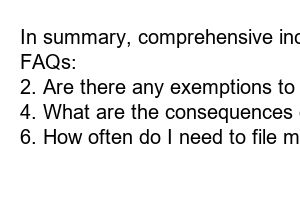종합소득세 대상자
Subject to Comprehensive Income Tax: Understanding the Basics
Are you aware of your tax obligations? As a responsible citizen, it’s crucial to stay informed about the various types of taxes imposed by the government. One such tax is the comprehensive income tax. In this blog post, we will delve into the details of comprehensive income tax, its implications, and what you need to know to navigate through the complexities of this tax system.
1. What is Comprehensive Income Tax?
Comprehensive income tax refers to a tax structure that considers all types of income earned by an individual or entity. Unlike regular income tax, which only takes into account wages and salaries, comprehensive income tax encompasses all sources of income, including investments, dividends, capital gains, and more. It is a more inclusive tax system that aims to ensure fairness and ensure that individuals or entities pay taxes on their entire income.
Under comprehensive income tax, individuals or entities are required to report all sources of income and pay taxes accordingly, giving a more accurate picture of their financial standing.
2. Who is Subject to Comprehensive Income Tax?
In most countries, individuals and entities with significant income from various sources are subject to comprehensive income tax. This includes self-employed individuals, freelancers, business owners, investors, and those with multiple income streams. If you earn income from investments, property, businesses, or any other source beyond your regular job, you are likely to fall under the purview of comprehensive income tax regulations.
3. How is Comprehensive Income Tax Calculated?
To calculate comprehensive income tax, you must report all your income sources and apply the corresponding tax rates to each category. The tax rates may vary depending on the specific rules and regulations in your country or state. It is recommended to seek professional tax advice or use reliable tax software to accurately determine your comprehensive income tax liability.
4. What are the Implications of Comprehensive Income Tax?
Comprehensive income tax may seem overwhelming at first, but understanding its implications is crucial for responsible financial planning. It is important to accurately report and pay your taxes on time to avoid penalties or legal consequences. Failure to comply with comprehensive income tax regulations can result in fines, audits, or even legal action. On the positive side, paying comprehensive income tax ensures you are contributing your fair share to society and helps fund public services, infrastructure development, and social programs.
5. Are There Any Benefits to Comprehensive Income Tax?
While the concept of paying more taxes may not be enticing, there are benefits to comprehensive income tax. A transparent tax system helps reduce income inequality and ensures a more equitable distribution of wealth. It also fosters trust and confidence in the government and promotes economic stability. Additionally, by reporting all sources of income, you establish a clear financial record, which can be beneficial for various financial transactions.
6. How Can I Minimize Comprehensive Income Tax Liability?
While it is essential to fulfill your tax obligations, it is also wise to explore legitimate ways to minimize your comprehensive income tax liability. Seek advice from tax experts or financial advisors who can guide you on tax-saving strategies, such as deductions, credits, and legal tax optimization methods. Investing in retirement plans, contributing to charitable organizations, and utilizing tax-efficient investment vehicles are some strategies that may help reduce your overall tax burden.
In summary, comprehensive income tax considers all sources of income and imposes taxes accordingly. It applies to individuals and entities with various income streams and requires accurate reporting and payment. While it may seem complex, understanding comprehensive income tax can help you fulfill your tax obligations, minimize liabilities, and contribute to the overall welfare of society.
FAQs:
1. What is the difference between regular income tax and comprehensive income tax?
2. Are there any exemptions to comprehensive income tax?
3. How can I keep track of all my income sources for comprehensive income tax reporting?
4. What are the consequences of not paying comprehensive income tax?
5. Can comprehensive income tax rates change over time?
6. How often do I need to file my comprehensive income tax returns?

